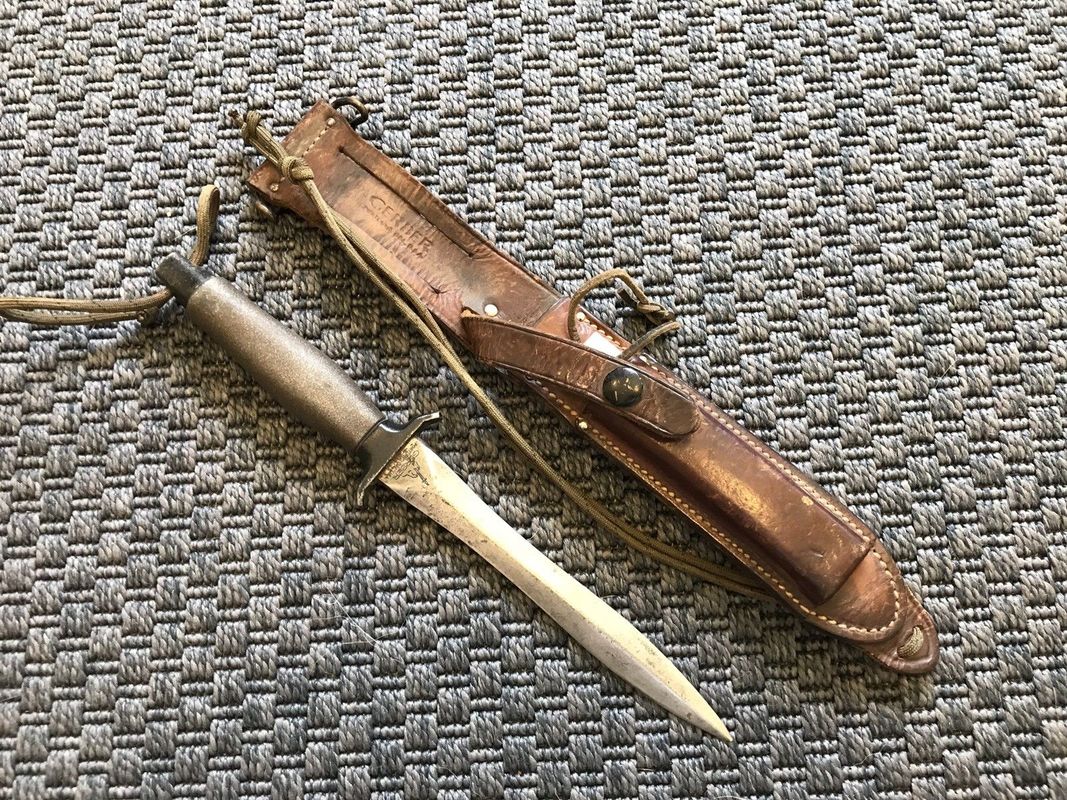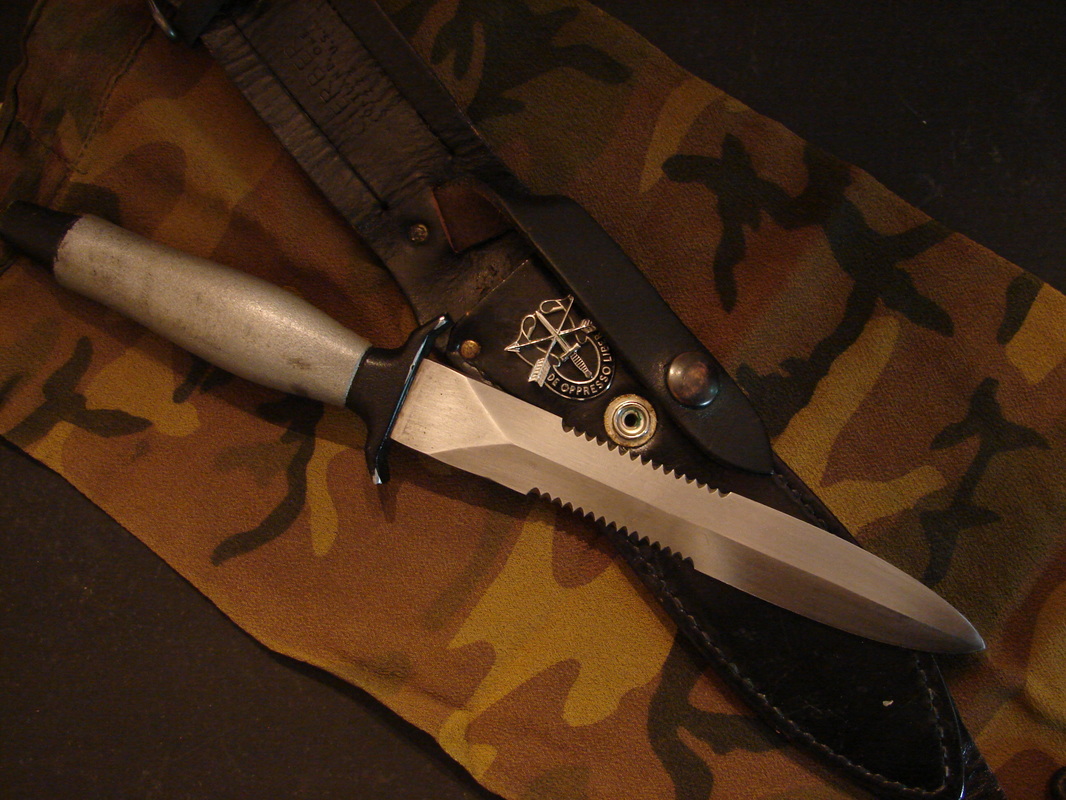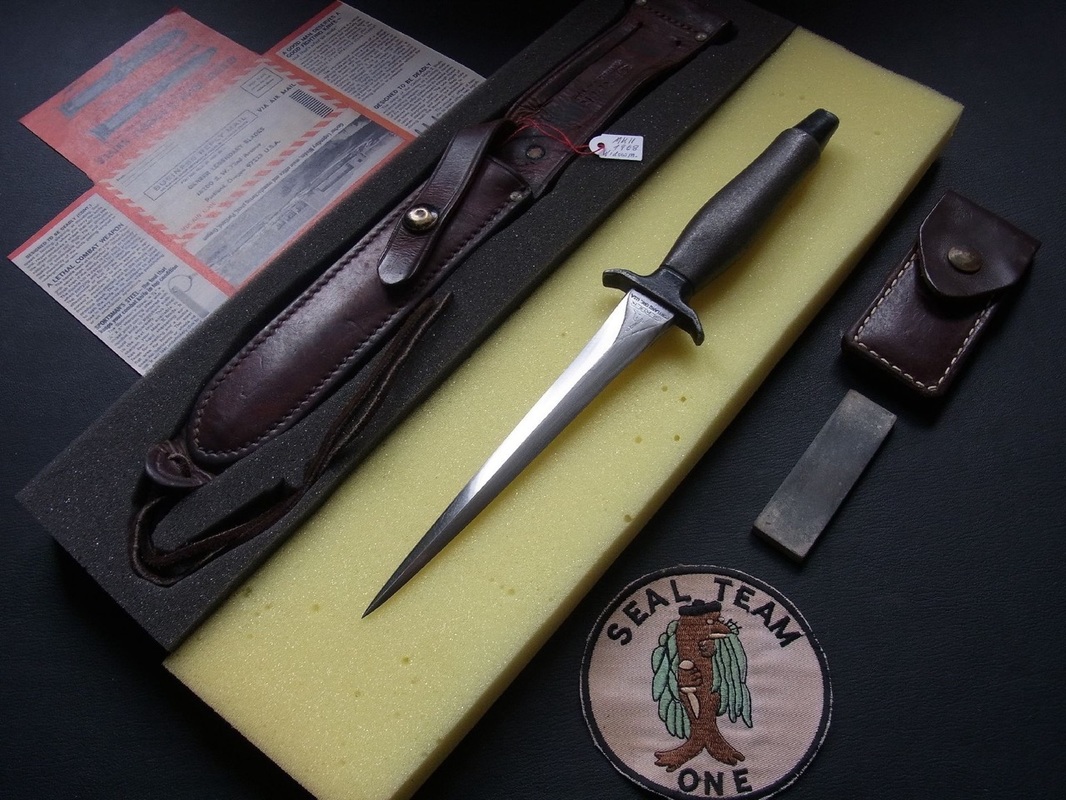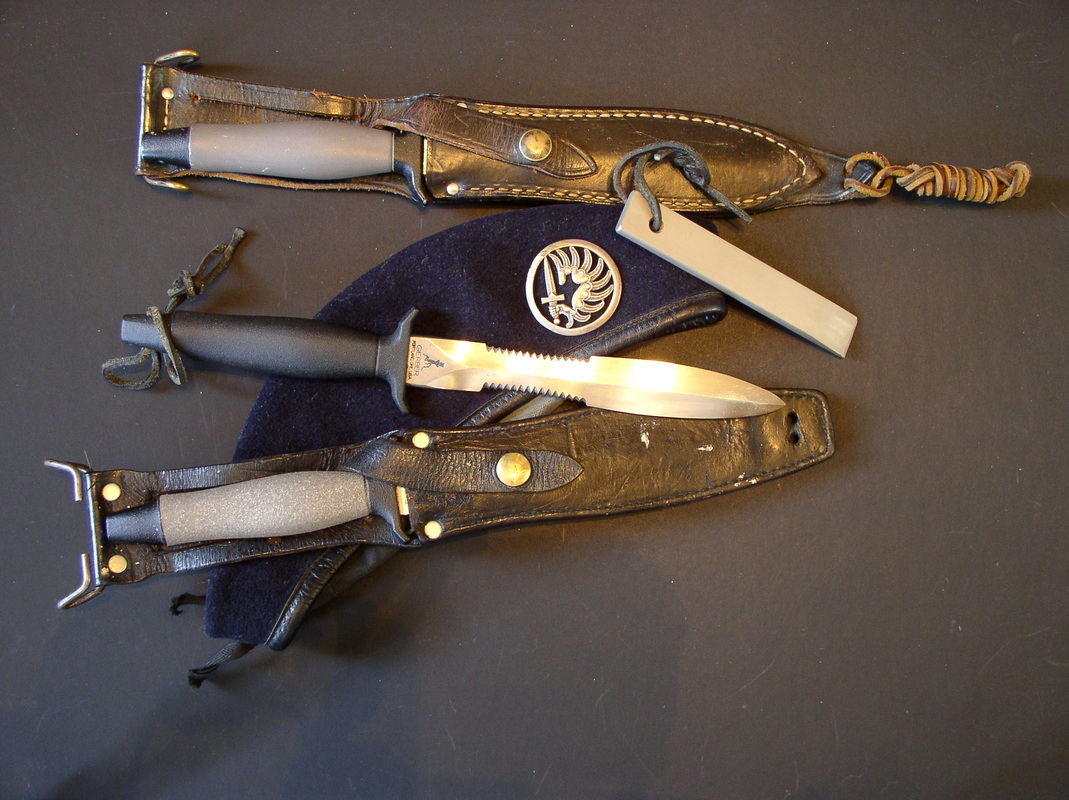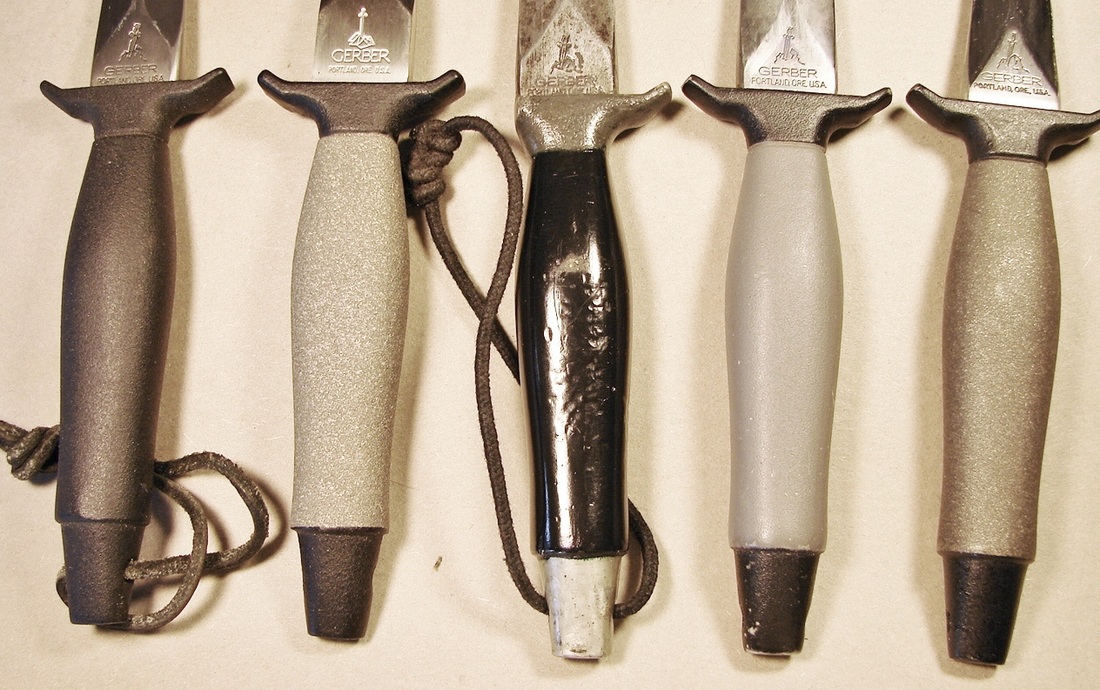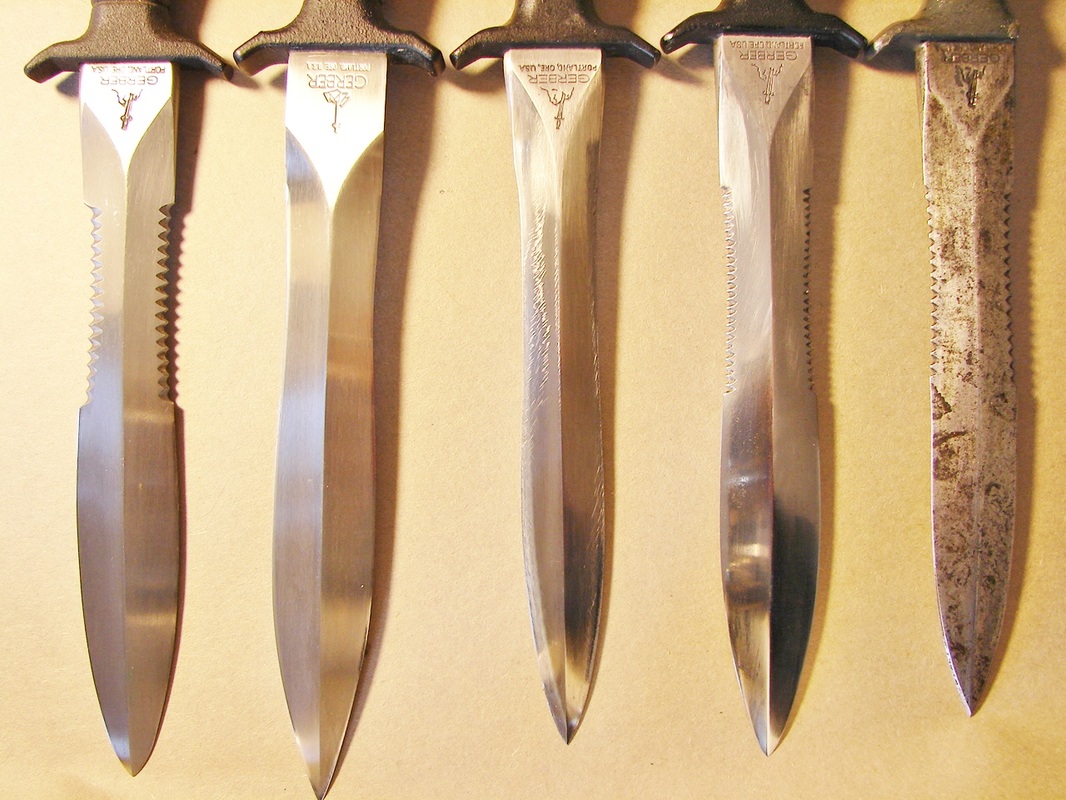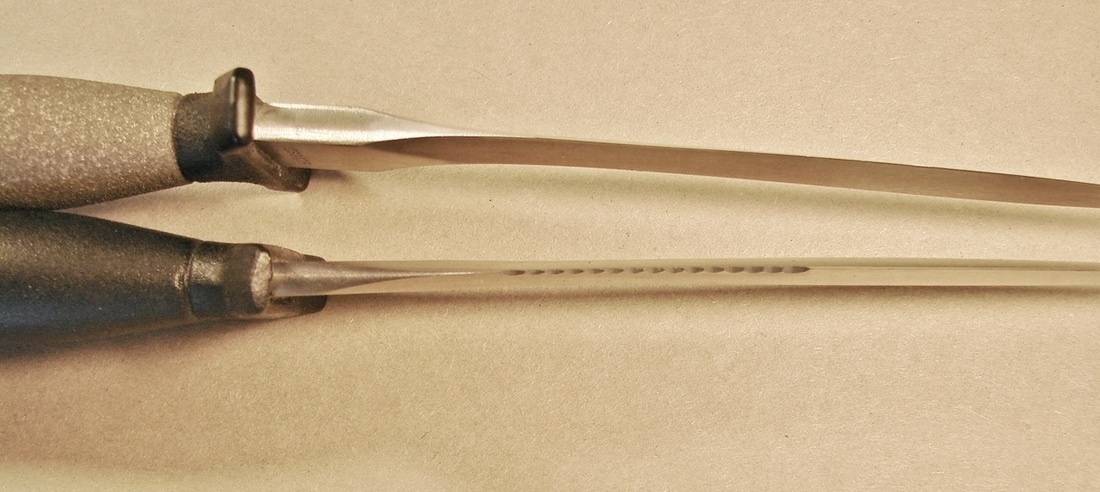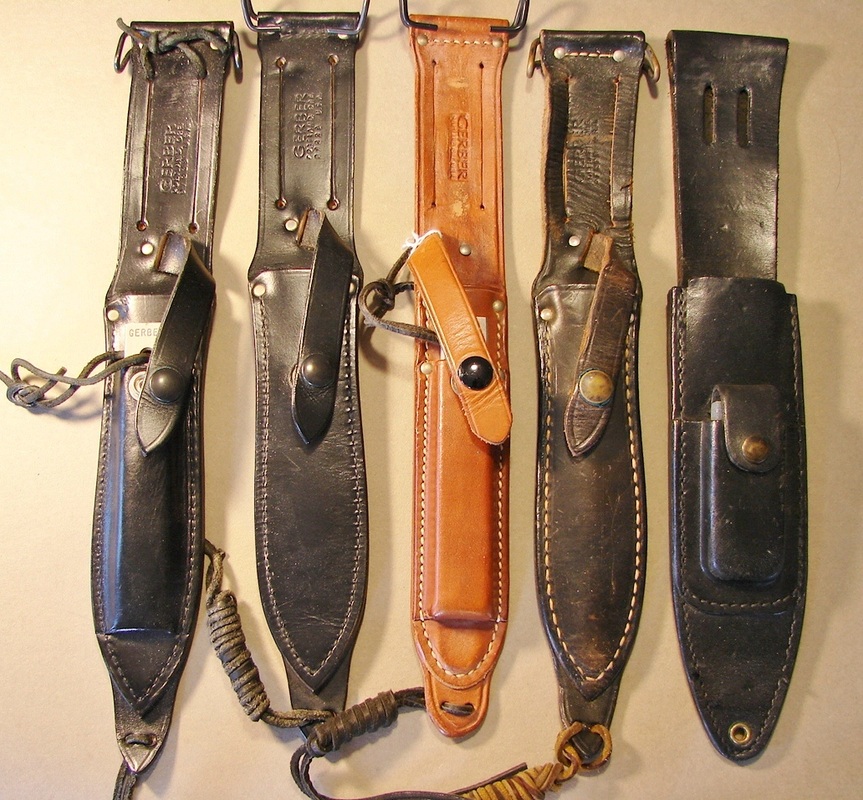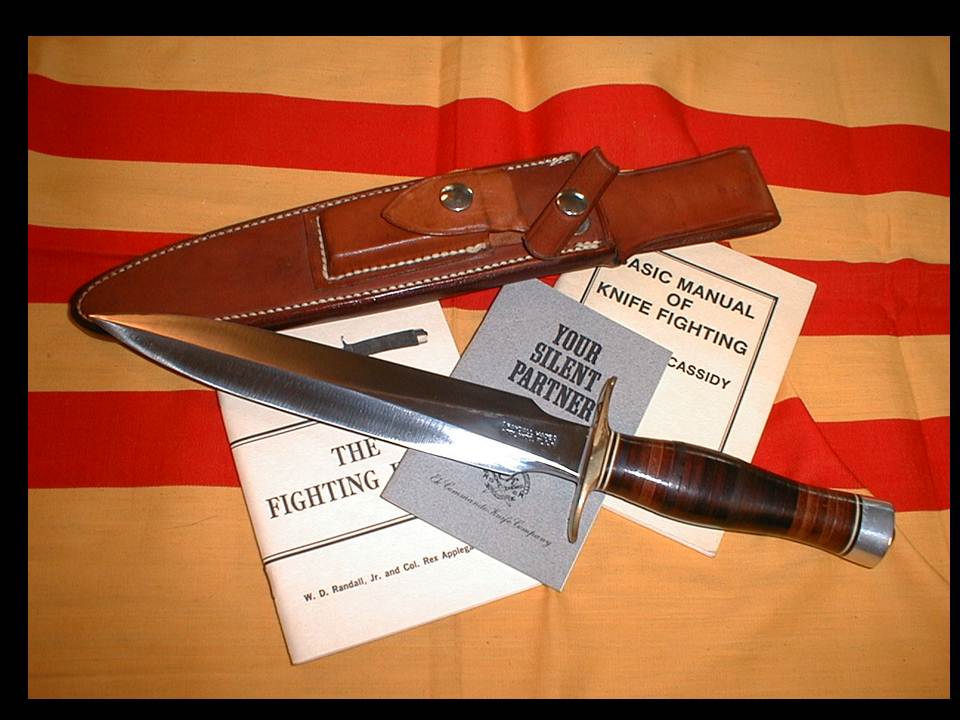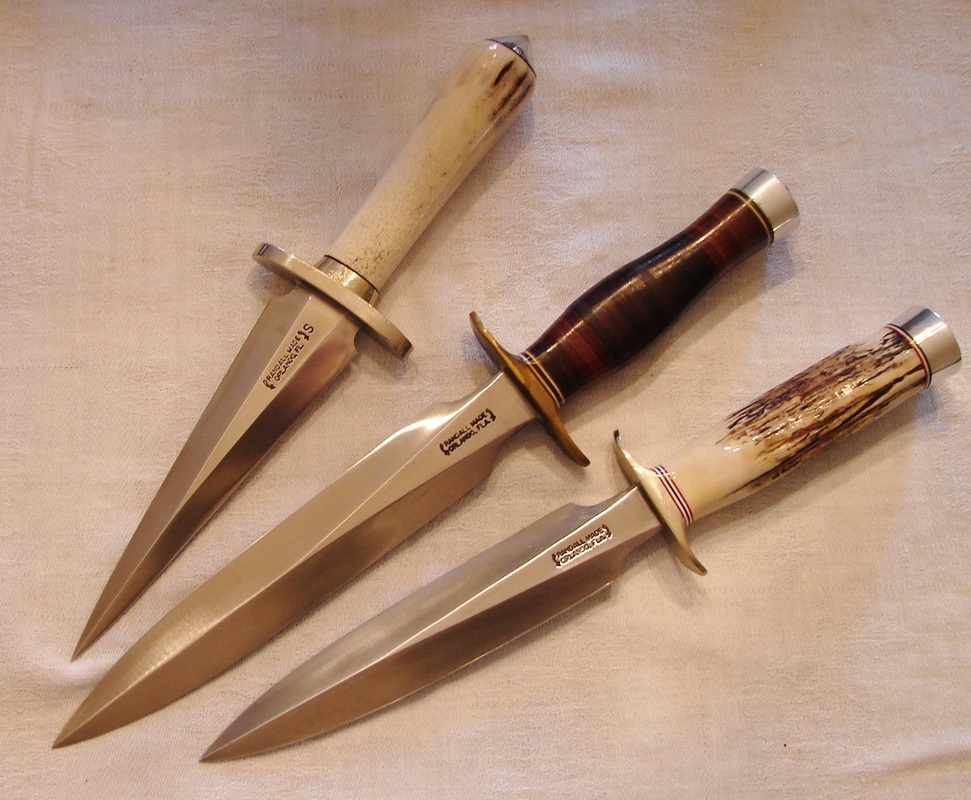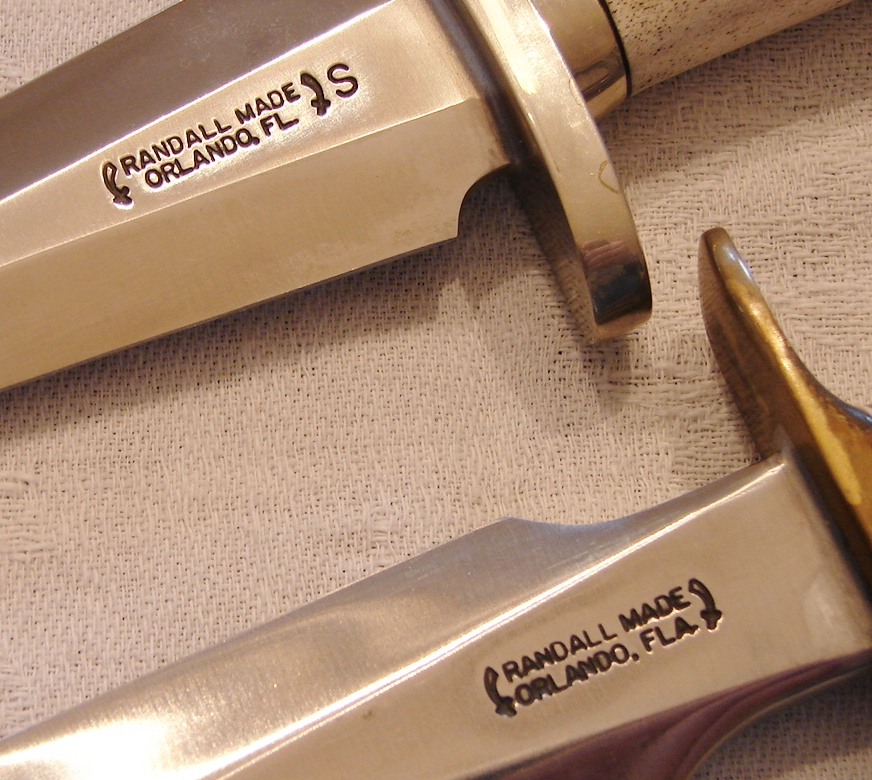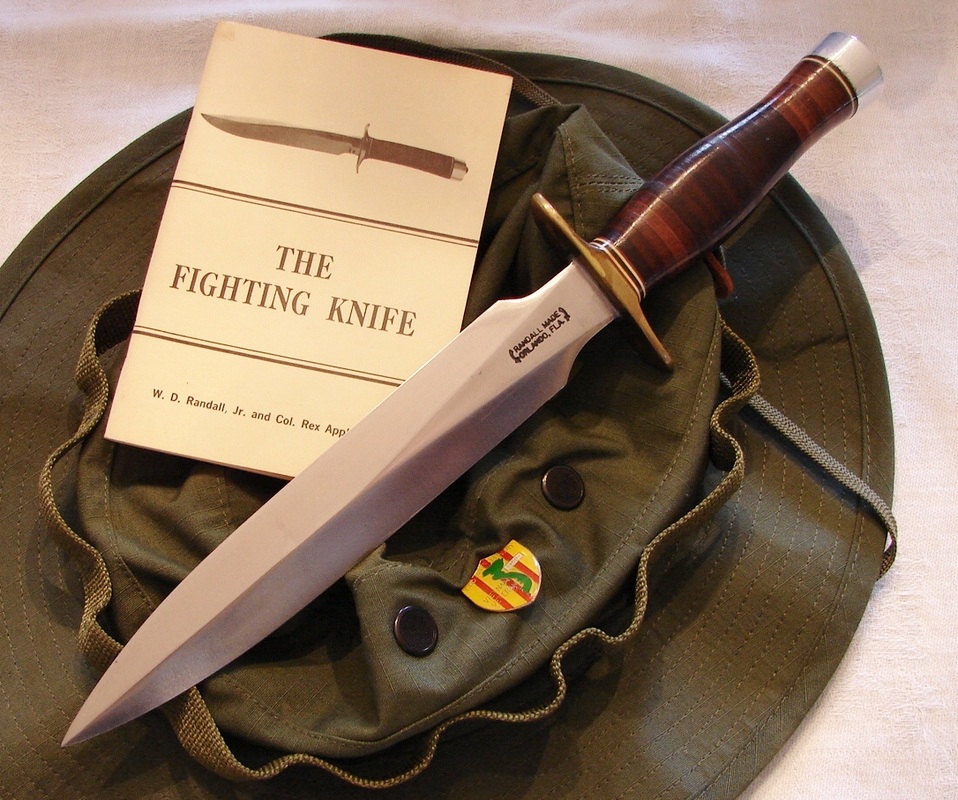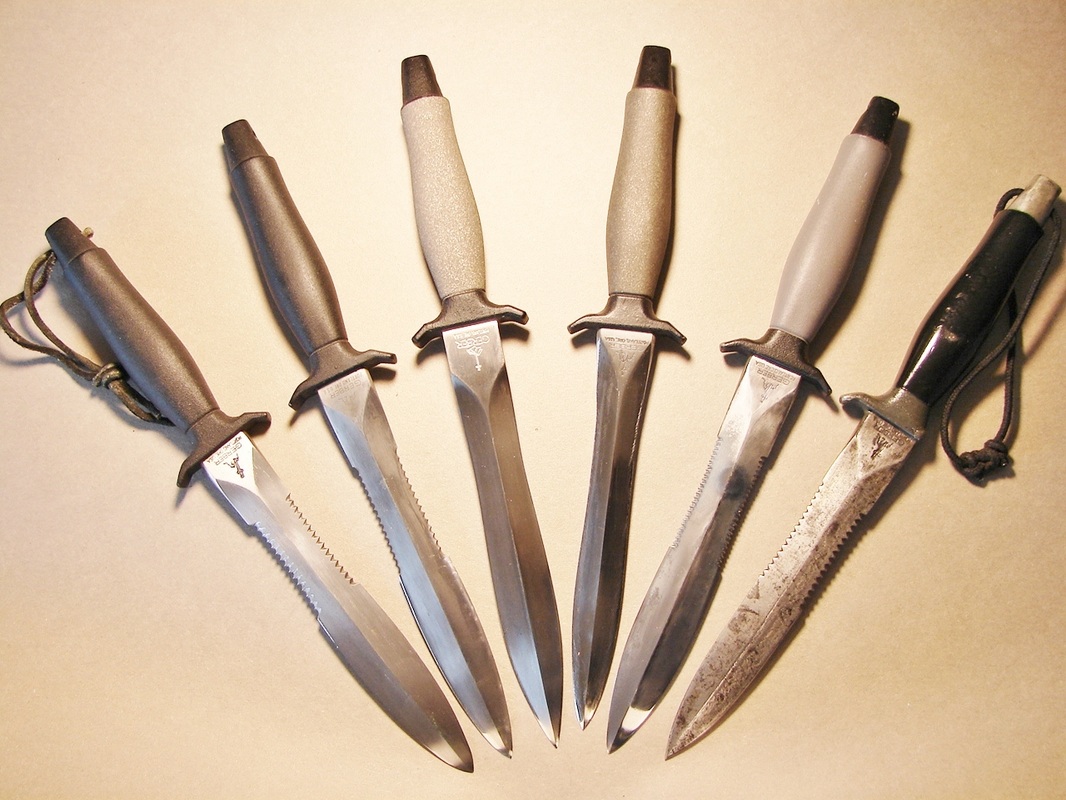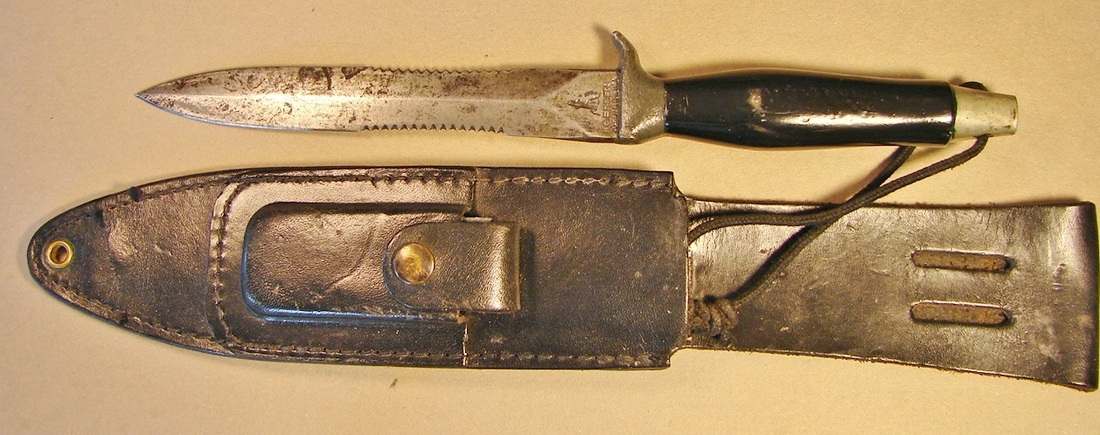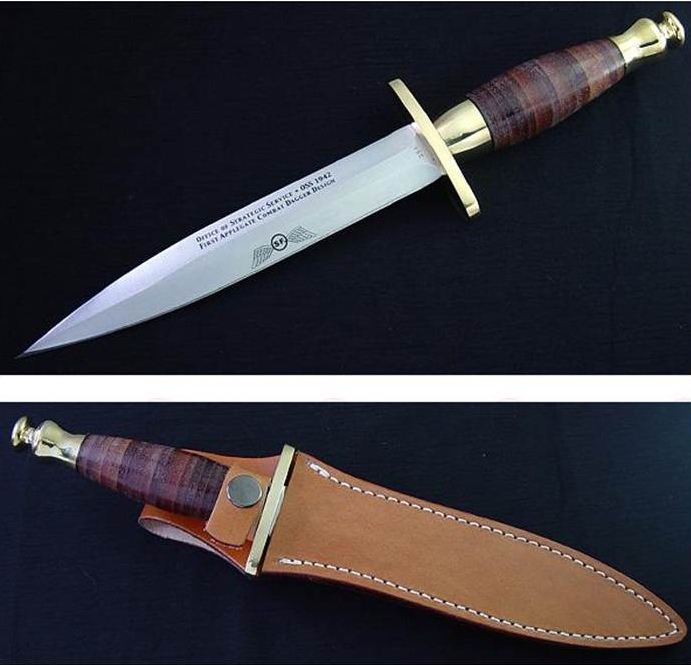GERBER MK-II Knives
OOPS! My last MK-II was supposed to be the last Gerber. Somehow I screwed up and bought this one. Lord knows I am a bad boy. I could not resist this early 1967 MK-II with cat's tongue grip and very slender blade. I blame the man who took these photos and made them so tempting. I think you'll see why I could not resist, try as I might. The serial number is under 5,000. Unfortunately it doesn't have a canted blade.
Below: My last Gerber Mk-II purchase. Yes my wife is going to kill me, but there are somethings a man has to do.............right? Odd thing about the knife is I believe that someone sanded/filed off the Gerber logo. You can almost see the outline in the image. If they wanted a sterile knife, why then would they add the SF crest? Perhaps they added it later in retirement? The serial number places the date of manufacture in 1979. This is long after Vietnam but there were other conflicts aplenty to go fight in. No grey handled knives at that late date. It looks like the same person sanded off the black finish in the middle of the handle to make it look like a gray handle. Maybe they just didn't like the basic black look and in 1979 could not buy a grey one. A quick lick with a diamond hone had the edges ready to slice and dice again. Like the Fairbairn-Sykes, the Gerber MK-II is a quintessential combat dagger of a later age. Valor Knives made some fair quality replicas, in the day.
Below: An incredibly beautiful 1968 vintage Gerber MK-II that was professionally altered during the Viet-Nam war era. This knife was reground to a needle-like point similar to a WW-II Metford-Fairbairn. Whomever performed the work did a superb job of grinding the blade. Photo courtesy of Michel Gassier. Clearly the person who carried this knife was not intending to use it for anything other than assassin-like attacks. This Gerber is my all time favorite and I think WE Fairbairn would have heartily approved of it. If anyone has one like this for sale.......contact me.
|
Gerber MK-II:
Just as the Fairbairn Sykes is the Iconic knife of WW-II, the Gerber MK-II filled that role for the American soldier in Vietnam. I recently discovered that I was wrong about the original designer. The MK-II was designed by retired Army Captain Bud Holzman, not Al Mar. The MK-II were a much stouter knife than the F~S and employed better ergonomics in the handle. The photo below gives you an idea of the wide range of handle styles and finishes that were used during the time the MK-II was first produced. From left to right: a 1978 mat black handle, grey cat's tongue, black glossy, grey smooth handle, and a 1968 with less aggressive cat's tongue finish.
An array of blades showing variety of profiles and differences between serrations and two non-serrated blades. All of them are wasp-waisted to one extent or another. Interesting, perhaps, is that the smallest blade in the middle is also the earliest one from 1968. Several of them are canted blades including the one on the left which is from 1978. The "canted" blade has a five degree bend at the guard which was intended to make the knife lie closer to the owners body, to prevent the handle from snagging on jungle undergrowth, clothing, or gear.
These two knives have their handles held parallel. The top knife has an obviously canted blade. For comparison, the lower one has a straight blade. Canted blades are rarer and therefore much more desirable.
Sheaths came in a variety of shapes and colors. Some were fitted with a pocket for a stone or steel, others were plain. You can see there are black, dark brown, and a natural tan colored examples. They all have the metal GI style belt hanger except the one on the far right which is likely a replacement sheath. The knife with the glossy black handle came in this sheath. It's knife is missing one branch of its guard and actually fits pouch-like down into the sheath.
|
Randall Made Knives:
Bo Randall (a true Southern Gentleman) of Orlando FL. built a better mousetrap when it came to double-edged fighting daggers. Hand-forged and hand-ground blades were fitted with neatly shaped and soldered brass guards and leather washer handles, they are topped with stout aluminum butt caps to balance the knife. This particular knife is a Model 2 with eight inch blade dating to the Vietnam War era. The handle shape is still referred to as the "commando" handle. This Vietnam era Model 2 is in mint condition, pretty well eliminating any chance that it was ever carried in combat. Many times stronger than a Gerber or an F~S, it is an excellent fighting knife.
Arkansas Toothpick: I have sold or traded off almost all of my Randall knives except the VN era 2-8 (center) and a small 2-4. I used the money to buy more F-S knives. Randall also offers a "Toothpick" design which harkens back to the Old West and Gold Rush Days. The toothpick comes in several different lengths from boot knife size to Bowie size and with many handle options. There is no finer fighting knife in the world than a Randall Made knife. They have been serving American fighting men since WW-II constructed of only the best materials, rugged construction, and superb designs. The handmade blades are available in a carbon steel or stainless. Note the "S" on the top blade indicating it is a stainless steel.
If you are very patient you can custom order exactly what you want but expect to wait about 3 years for delivery. The best bet is to buy from one of many dealers who suck up all of the production, causing the long lead times. Handles may be had in either the standard leather washer with aluminum butt cap, stag, or micarta. It is hard to imagine any fighting knife that would serve its owner better than this 8 inch bladed model 2.
Randall is also justifiably famous for several large Bowies and bowie style fighting knives, notably their Model 1 and Model 14 (both were very popular during the Vietnam war). They are also famous for their Model 17 "Astro" survival type knife which was carried into outer-space by numerous astronauts.
|
Here is an array of my Gerber MK-II (Mark Two) survival/fighting knives. They were, without a doubt, among the more popular knives to own and carry during the Vietnam war. The handle is extremely ergonomic, the blades were delivered hair-shaving sharp, and they came in a well designed and high quality leather sheath. Note the knife on the far right has had one branch of the guard shorn to provide the owner with a thumb ramp. This was not uncommon. I have in fact seen others with both arms removed to make the dagger even more low profile. The handles were tough, cast aluminum with an integral guard. The Gerber MK-II of that era was one of the finest fighting knives ever made. The new ones are lackluster, missing that earlier grace and elegance. During photographing these knives I discovered that the blade of the 1968 knife is strongly magnetic? I am not sure how that might have happened, when or why.
As I mentioned once or twice before, I have a soft spot for old Tomcats like this knife. Pristine knives to me are generally boring knives. This knife has had one side of the guard removed to allow the user to place his thumb there. The over-sized, non-traditional sheath allows the knife to slide completely down into the sheath, including the partial guard. Gerber Knives used L-6 tool steel for their blades and they were very susceptible to staining and rusting.
Applegate - Randall - Fairbairn:
Shown below This Applegate-Fairbairn-Randall was reproduced by Boker Knives in Germany. The original knife was produced by Randall knives of Orlando. Florida. This was Col. Rex Applegate's version of an improved and stouter Fairbairn, but it is not much different from a Randall Model 2. It is a well built knife and a reliable combat companion. The Boker knives were a very limited production run and quite scarce today. It came with this high quality leather sheath. More than one person has said it looked like a spin-off from the original Shanghai Daggers. Some people claim Applegate was taking credit for what was basically a Yeaton-Fairbairn Shanghai dagger design. I do not particularly agree with their reasoning.
